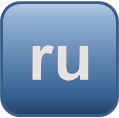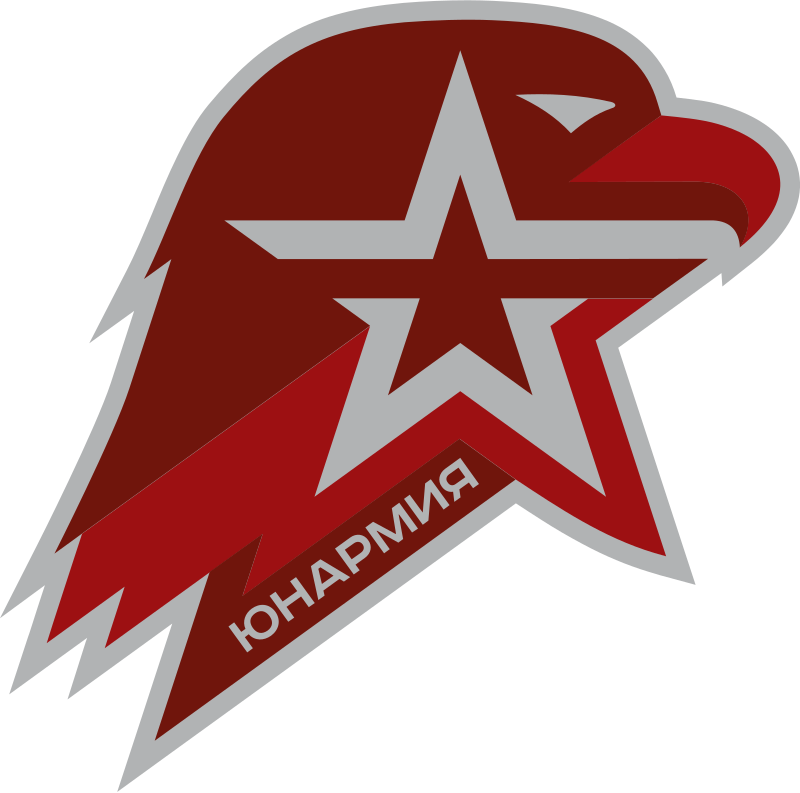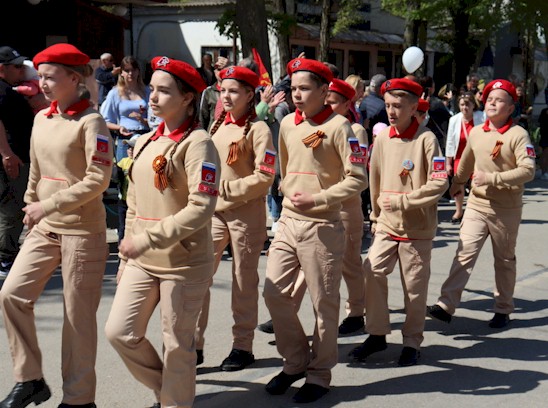Indoctrination programmes
Brainwashing
Companies that employ trolls, such as the Internet Research Agency discussed in detail in this section, recruit their - mostly young - employees at the so-called Seliger camp, among other places. This is an annual gathering of young people at Lake Seliger, some 350 km from Moscow, with a strong indoctrination character.
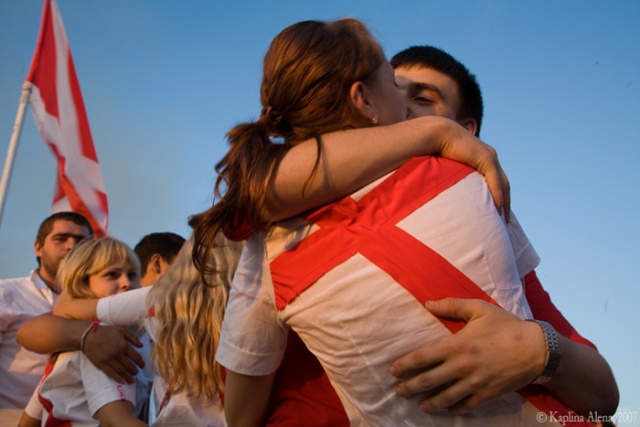
Youngsters at a Seliger camp
Walking together (The Putin Jugend)
Just like the communist party during the time of Lenin and Stalin, Vladimir Putin's entourage understood that early indoctrination produces loyal and cheap followers. It began in May 2000, with the founding of Идущие вместе [Idushchije vmjesty] or Walking Together by an employee of Vladimir Putin's administration, the then 29-year-old Vasily Grigorievich Yakimenko (°1971). This youth movement applied strict rules and drastic indoctrination methods that were reminiscent of the Komsomol from the Soviet era. The members were particularly noticed for their actions against the contemporary Russian writer Vladimir Georgievich Sorokin (°1955) and the rock band Leningrad. The symbols and internal working methods quickly earned the group the nickname Putin Jugend. With rewards such as «stars» and T-shirts with Putin's image, the members' activism was stimulated. For example, a member who had earned his first «star» had to bring in 50 new members. In 2004, Walking together found itself in a crisis. One of the group members had become involved in the distribution of pornographic videos, and financial disputes arose between the St. Petersburg branch and the headquarters in Moscow. This was the signal for the Kremlin to establish a new movement on March 1, 2005.
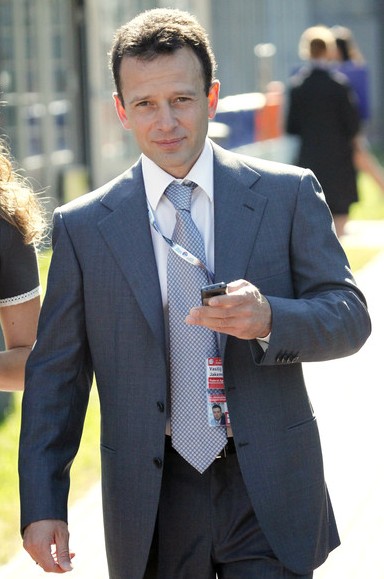
Vasily Grigorievich Yakimenko
Nashi
The new movement was called Наши [Nashi] or Ours. It was founded in response to the Orange Revolution in neighbouring Ukraine a year earlier, in which protests led by young demonstrators had helped elect pro-Western president Viktor Andriyovich Yuschenko (°1954). Nashi aimed to prevent or disturb mass demonstrations in Russia by occupying squares before the opposition had a chance to gather there. It was again led by Vasily Grigorievich Yakimenko (°1971). According to his own statements, the movement received money from the Kremlin. In 2010, that would have been 200 million rubles - at that time it was 5.4 million euros. Vladislav Yurievich Surkov (°1964), the man of the Friday meetings with the press mentioned elsewhere on this website, is generally seen as one of the initiators. He dreamed of a paramilitary group that could threaten and attack Putin's critics as «enemies of the state». Click the arrow below to learn more about Friday Meetings
At a political education event in 2006, the Kremlin adviser Gleb Olegovich Pavlovsky (°1951), also mentioned earlier, said that in his opinion the Nashi members did not show enough brutality: «You must be prepared to break up demonstrations and to deal violently with any attempt to attack the constitution». Nashi regularly takes action against foreign embassies. For example, in 2006 the movement stalked the British ambassador to Moscow, Anthony Brenton (°1950), and his family for four months, seven days a week. The action was carried out because Brenton had attended an opposition conference. The group also distributes pamphlets in which unsaid statements by disgraced politicians such as former Prime Minister Mikhail Mikhailovich Kasyanov (°1957) are presented as factual quotes, or in which the Soviet Union is depicted as a period of material prosperity and abundance. Several members of Nashi have testified that they were paid to participate in demonstrations or counter-demonstrations. A typical fee is 500 rubles. Nashi also provides the foot soldiers for other projects to glorify Russian leaders, including the beautiful Medvyedev Girls. This girl group, which sometimes went topless to support the policies of former Prime Minister Dmitry Anatolyevich Medvyedev (°1965), was founded on 4 August 2011.
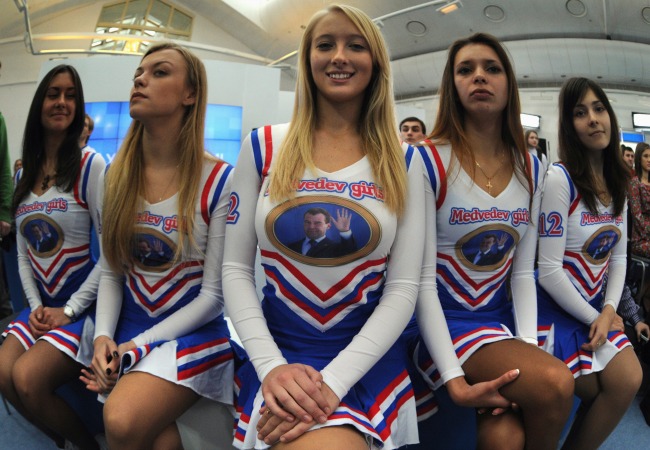
The Medvyedev Girls
In order to further expand the base of the influx of young people into Nashi, the Мишки [Misjki] or The Little Bears movement, a pro-Putin children's movement for children aged 8 to 15, was founded on 6 December 2007. Just as Nashi can be compared to the Komsomol, this movement for children, founded by Yulia Konstantinovna Zimova (°1987), shows striking similarities with the Pioneers from the Soviet period. From an early age, the children are brainwashed to show unconditional love for the person of Vladimir Putin, and they are also called upon for demonstrations, such as, among others, during the infamous elections of 2012.
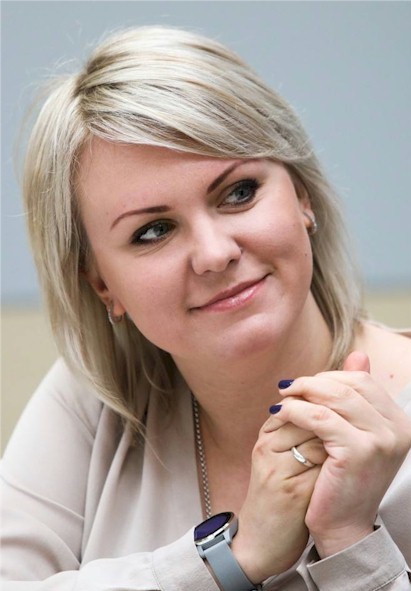
Yulia Konstantinovna Zimova
In the schools
Since Putin came into power, and especially since the start of the invasion of Ukraine, much has changed for the 18 million schoolchildren in the Russian Federation. Knowing that young people growing up in the Internet era are less susceptible to television propaganda than their parents, a different approach was needed to indoctrinate them.
Since September 2022, schools across Russia have started each week with a flag-raising ceremony, followed by a session called «Discussions on important issues». The government requires schools to hold regular «patriotic events» and use a state-prescribed curriculum to justify the invasion of Ukraine to students. At the same time, the Russian Ministry of Education requires schools to upload footage of these events to a state-run portal to prove compliance with the rules.
For the Elementary School No. 1 in the city of Karabash in the Chelyabinsk region, popular teacher Pavel Ilyich Talankin (°1992) had to film the events. Talankin initially planned to resign because he did not want to support Russian aggression, but he retracted his resignation after seeing a post on Instagram from the producers of a Russian TV series looking for people whose work had been influenced by the Russian invasion of Ukraine. That's how he got in touch with documentary filmmaker David Borenstein, who was born in Miami, Florida, United States, but works in Copenhagen, Denmark. Talankin began collecting footage with two cameras. «I filmed with two cameras. One was high quality, the other was poorer. The lower quality footage I sent to the ministry, completely unedited. The better quality footage – which captured the sound and so on – I saved on a hard drive.» The footage provides a striking picture of how militaristic propaganda in education evolved from March 2022 to June 2024. It shows, among other things, how one day the mercenaries of the Nazi Wagner group led by the infamous Yevgeny Viktorovich Prigozhin (1961-2023) came to the school to give a lecture. In another scene, a teacher is shown disrupting the flag-raising ceremony by playing Lady Gaga's version of The Star-Spangled Banner instead of the Russian national anthem.
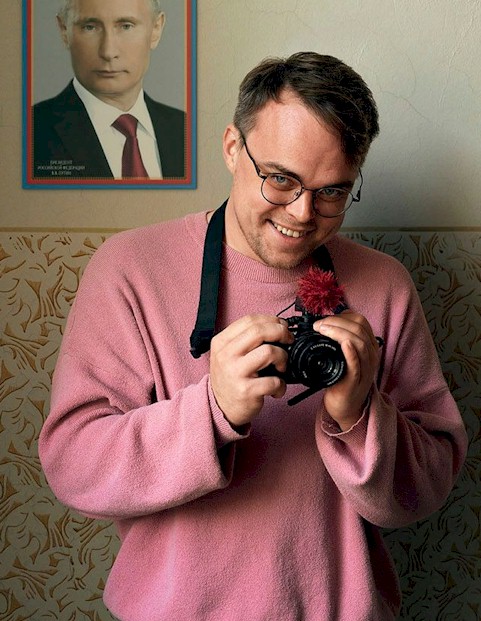
Pavel Ilyich Talankin
Talankin secretly consulted with David Borenstein to edit his footage into a documentary film. In June 2024, he left Russia and they edited Mr. Nobody Against Putin together. The film premiered on January 25, 2025 at the Sundance Film Festival in Park City, Utah, the United States, where it won the World Cinema Documentary Special Jury Award. It was then shown at the Gothenburg Film Festival in Sweden.
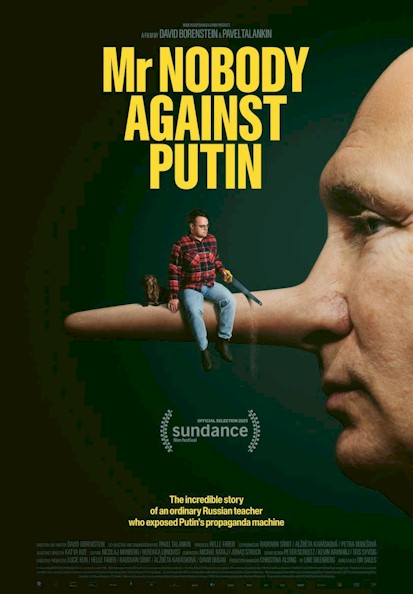
Mr. Nobody Against Putin
We can't show the documentary here (yet). When we can, you will definitely be able to watch it here. In the meantime, we'll post the trailer below.
Fighting toddlers
In 2014, the year when Russia annexed Ukraine's Crimea and when the first troops of soldiers without insignia began de facto the war against Ukraine in the Donbas, Russia established its first special cadet groups, emphasising patriotism and basic military training. In a special cadet group, children aged 4 to 7 practice shooting and hand-to-hand combat, meet soldiers participating in the war against Ukraine, try on gas masks and bulletproof vests, weave camouflage nets, and attend city events in full dress uniform.
Starting with cadet groups in more than 50 schools across 26 Russian regions, the «junior cadet» movement has expanded rapidly since the start of the large-scale Russian invasion of Ukraine. By 2022, there were 100 groups in at least 57 Russian cities and towns, and by 2025, there were approximately 1.000.
In the summer of 2025, the Federation Council's Constitutional Legislation and State Building Committee announced plans to introduce a unified law on cadet training, to be adopted in 2026, aiming to preparing «elite individuals» for military and public service.
With God's blessing
There are also some 30 training camps for young people organised by the Orthodox Church. These Православные военно-патриотические клубы (ПВПК) [Pravoslavnye voenno-patrioticheskiye kluby (PVPK)] or Orthodox Military-Patriotic Clubs (OMPC's) are active in at least 15 regions of Russia, affiliated with local dioceses or with the blessing of metropolitan bishops - the Church Fathers heading a church province or metropolis.
Some strive to help their students «to achieve the status of protectors and Russian men», while others strive «to help boys grow into men, and girls into real women who understand their unique and beautiful place». Some clubs even work with «difficult» children with «special needs».
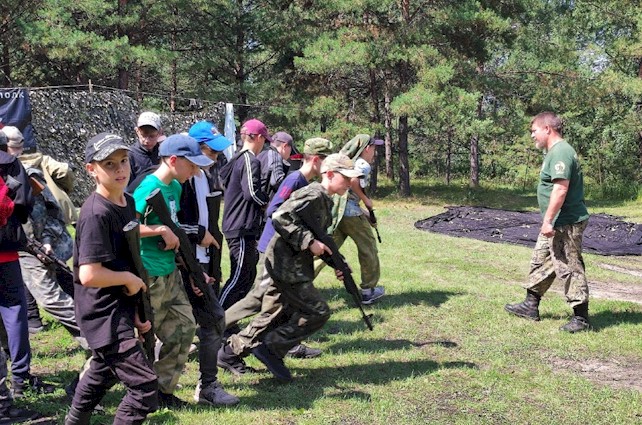
Camp of Bogatyrskaya Zastava 2025
In addition to lessons in combat techniques, the clubs organise regular meetings with priests, where children learn why it is important that «an army is supported by holiness». As Father Sergiy Polivtsev of the Orthodox military-patriotic club Воин [Voin] or The Warrior from Murmansk, explained, «faith gives spiritual strength, steadfastness, and invincibility».
Yelena Cheshegorova, director of the Orthodox military-patriotic club Богатырская застава [Bogatyrskaja Zastava] or Bogatyr Outpost in Omsk, explains that the club regularly organizes tent camps «to promote children's versatility». The programme includes morning prayers, Russian hand-to-hand combat, basic self-defense for girls, sword fighting, horseback riding, traditional medicine, handicrafts, and other activities. According to her husband, Ilya Cheshegorov, the children are outdoors «almost 24/7» during the camp, living in tents of four or five people. However, he believes the spartan conditions do not hinder the development of a harmonious personality.
[*] In Russian epics, a bogatyr is a hero of remarkable strength and courage who performs heroic deeds in the name of the Motherland. A bogatyr outpost is an advanced detachment of bogatyrs who guard the borders of their native land.
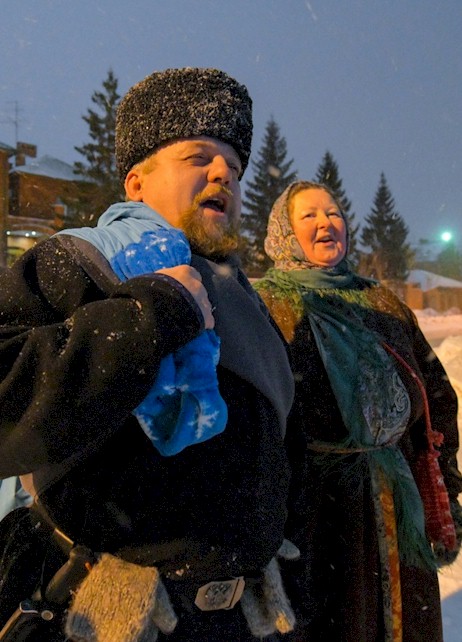
Ilya Cheshegorov and Yelena Cheshegorova
The Young Army
A step further than the «fighting toddlers» of the junior cadets mentioned above is the Юнармия [Yunarmia], or Young Army. Its members are the Юнармеец [Yunarmejets], or Young Army Cadets. This «All-Russian» military patriotic social movement was formally established by a presidential decree issued on October 29, 2015, at the behest of Defense Minister Sergey Shoigu. It quickly became one of the most important mechanisms for the militarisation and mobilisation of youth in Russia. The organisation has its own flag and emblem and is officially registered as a legal entity. Essentially, the Young Army Cadets are the military wing of the broader Russian Youth and Student Movement, established in 2015 under the Federal Service for Supervision of Education and Science, Ministry of Education and Science of the Russian Federation. In terms of structure and activities, even more than Walking Together, they can be compared to the infamous Hitler Youth in fascist Germany in the 1930s. The young people are trained in firearms training, hand-to-hand combat, and martial arts, and are prepared for deployment in the war in Ukraine after their conscription into the Russian Armed Forces. In the occupied territories of Ukraine, members of the notorious far-right Wagner Group have provided weapons training to Ukrainian children of the Young Army Cadets. A number of famous athletes, cosmonauts, and actors work at the national headquarters to broaden the movement's appeal.
|
Kidnappings
Since the start of the Russian invasion of Ukraine, thousands of Ukrainian children have been kidnapped by the Russian army. The Kremlin itself says that Russia has been able to «remove 700,000 children from the war that Ukraine provoked. The children are being protected from the Nazi regime in Kyiv». Ukraine says it has verified the names of more than 19,000 children who have been transferred to Russia or to Russian-controlled territory.
Removing children without the intention of repatriating them later is considered a war crime under Article 2 paragraph 'e' of the United Nations Convention on the Prevention and Punishment of the Crime of Genocide of 9 December 1948, but according to Putin that is not a problem in this case. He simply denies the right of Ukraine as a nation and of Ukrainians as a people. That means that Ukrainian identity is a threat to what they see as Russian children. The Ukrainian children are mainly abducted from the four regions that were annexed by Russia at the end of September 2022: Luhansk, Donetsk, Zaporizhzhya and Kherson. Russia sees those areas as Russian. So if you take the children away from there, that is actually a good deed.
The Dutch Hella Rottenberg of the journalistic platform Window on Russia, and author of the book Z How Putin wants to make Russia great again, described the entire organisation: «Before the regions were taken by Russia, they were heavily shelled by Russian troops. The only escape routes that were not bombed led to Russia. People had the choice to go to Russia or remain in danger. The escape routes often went along special filter camps. In those camps, children were separated from their parents and sent to Russia alone. Children were also brought to Russia from Ukrainian orphanages.
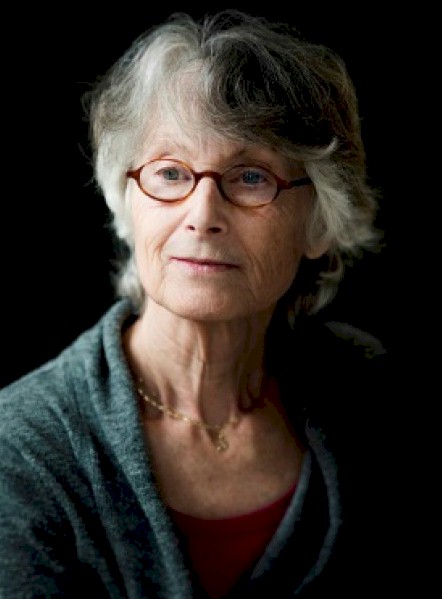
JHella Rottenberg
Once the children are in Russia, they are forcibly adopted by Russian parents or placed in children's homes. They also have to go to Russian schools. In this way, their Ukrainian identity is slowly erased. The children have to learn Russian and are no longer allowed to speak Ukrainian. They are only allowed to read Russian literature and only learn about Russian culture and Russian heroes».
The investigative journalist also found that Russia ensured that the children were quickly given a Russian passport. «The longer the children are in Russia, the harder it is to undo their brainwashing later and restore their origins and history. The intention is not for children to ever return to Ukraine, they are transformed into Russians».
The communication around these abductions was sometimes very cynical, as the video below shows. Try to imagine that our Children's Rights Commissioner has a child abducted by soldiers abroad and then adopts and indoctrinates it himself. Bizarre? Not for Putin and the Russian Federal Commissioner for Children's Rights Maria Alekseevna Lvova-Belova (°1984). She herself «adopted» a child that was abducted from Mariupol and she is quite proud of it.
Re-education and mobilisation
At least 6,000 Ukrainian children in the occupied territories have attended Russian state-funded summer camps. In February 2023, a Yale University study identified 43 camps that were described as re-education camps. The Kremlin does not deny this, but says the camps are an opportunity for children to «get away from the war for a while».
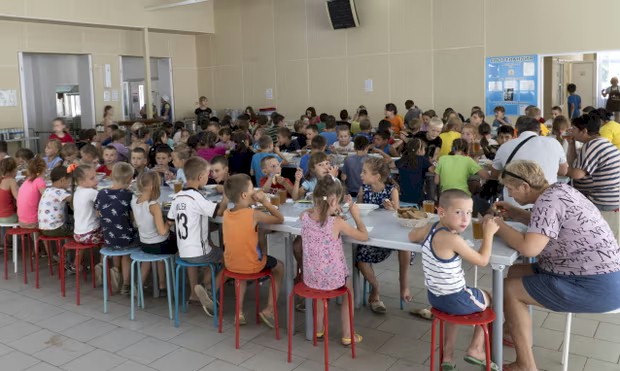
«Evacuated» children from Donetsk in the camp of Zolotaya Kosa (Rostov)
The camps run a programme called Послезавтра [Poslezavtra] or The Day After Tomorrow. It includes activities that «provide social and psychological support to children from the war zone» and aims to «introduce the children to the educational system, history and culture of Russia». In essence, it is about ideological indoctrination and Russification
The camps are organised by the administration of the aforementioned Commissioner for Children’s Rights Maria Alekseevna Lvova-Belova. She has entrusted the management of the programme, which is officially described as Humanitarian Aid to the Children of the Donetsk People’s Republic, the Luhansk People’s Republic and Ukraine, to a man who knows exactly what Russification is intended to achieve. After all, it is her advisor Aleksey Aleksandrovich Petrov (°1996).
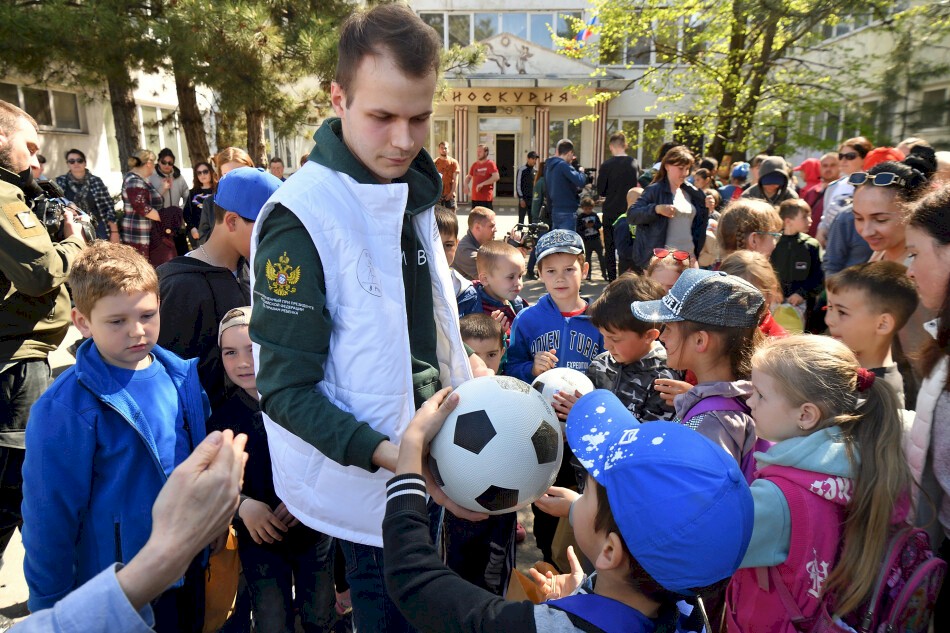
Aleksey Aleksandrovich Petrov handing out presents
Before he became an advisor to Lvova-Belova, this Petrov published messages from white supremacist, neo-Nazi and far-right groups on his own social media profiles. He also posted links on Skype and Instagram that referred to white supremacist organiations and to Adolf Hitler. Only after being asked for a response by the Reuters news agency in July 2023 he deleted some of his messages and links. He also resigned from some 150 groups, including the group Оставайся белым [Ostavaysa belym] or Stay White, which is dedicated to the idea of «the revival of great Russia».
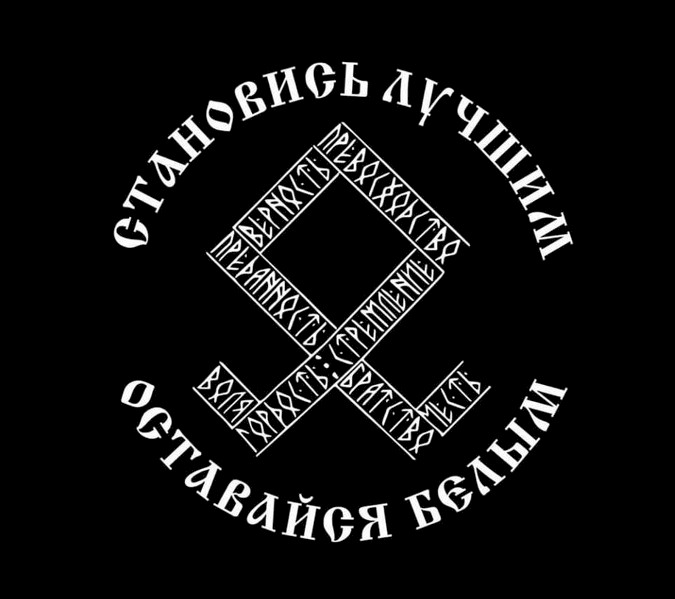
«Be the best. Stay white»
The Yale University report also showed that the deportation of Ukrainian children to Russia began even before the start of the large-scale invasion on February 24, 2022. The first transports of children in early February 2022 involved a group of 500 alleged orphans who had been «evacuated» by Russia from the Donetsk Oblast. The Kremlin justified this by stating that «an offensive by the Ukrainian army was expected.» Three weeks later, the Russian army offensive began.
The Reuters news agency witnessed how in January 2023, Commissioner for Children’s Rights Maria Alekseevna Lvova-Belova went to visit a group of abducted children at Vocational School No. 27 in Henichesk in occupied southern Ukraine. There she told a girl: «You will be able to study at any Russian university, even in Moscow». She promised the children Russian passports and said that they would each receive 100,000 rubles and an apartment after their 18th birthday if they stayed in the occupied territory.
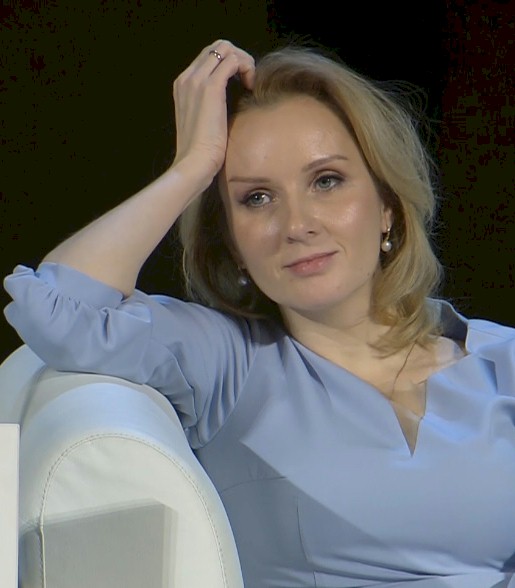
Maria Alekseevna Lvova-Belova
The boys, aged 16 and 17, are being kept under extra surveillance to prevent them from escaping and returning to Ukraine. After all, on the day of their 18th birthday, they receive a mobilization order to fight as Russian soldiers against their compatriots.
A shocking story in itself is the abduction of ten-month-old Margarita Prokopenko from the Center for Social and Psychological Rehabilitation in Kherson. It shows that the kidnappings are well prepared with the cooperation of high officials of the Duma and the Kremlin. You can read it by clicking on the link below.



